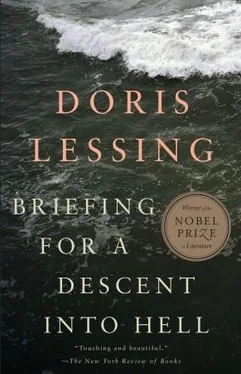And all the times between, when the inner strand was not attached to the camellia, it hung there, lightly quivering, always in subtle movement, waiting as it swung for the wind, as a surfer adjusts the balance of his body for an expected wave.
Sometimes, watching, I could feel the process on that wall as a unity: the movement of the honeysuckle spray, the waiting camellia, and the breeze which was not visible at all, except as it lifted the honeysuckle spray up and close to the camellia.
It was not: The honeysuckle spray swings and reaches the camellia.
It was not: The wind blows the spray on to its host.
The two things are the same.
Not until the spring came, when the honeysuckle spray lengthened its growth, and achieved a wider swing, was it certain of a really solid grasp of the camellia.
Now I see a third part of the process.
Not only: The movement of the spray made it reach the camellia,
Or: The wind blew it so it could reach the camellia,
But: The further growth of the honeysuckle made it possible to reach the camellia.
But the element in which this process exists is — Time.
Time is the whole point . Timing.
The surfer on the wave. The plant swinging in the wind. And it’s just the same with — well, everything, and that’s what I have to say, Doctor. Why can’t you see that?

It was ten at night in a ward or room shared by the Professor and three other men. The ward was cosy, with its pink curtains drawn. The Professor was reading that day’s Times . Outside was a wild night, noisy with wind.
Of the other three patients, two were already asleep, their bedside lights off, and one was listening to the radio through headphones.
A girl came into the ward. She wore flowered little-girl pyjamas, and a white fluffy dressing gown. Her señorita’s hair was now loosed from the formal bun, but she had pulled it back and tied it at the nape of her neck, making it a brown bush caught neatly by a pink ribbon bow. She was everything that was proper and right, but poor girl, she could not help herself and now the shock inherent in Miss Violet Stoke’s presence was because the little girl had a sad, knowledgeable woman’s face. She sat on the Professor’s bed and lowered her voice to say furiously: “Is it true?”
“Yes, I suppose so.”
“But why? Don’t. Please don’t. Oh please please don’t.”
That day the whisper had gone around that Professor Charles Watkins had voluntarily agreed to have electric shock treatment. Some of the patients were indifferent, but not many. Most were agitated by the news. He had become a bit of a symbol. For the Professor, unlike most of them, had had a choice. He had not been given shock treatment when many would have had it, because Doctor Y opposed it, in his case. But now, when he was himself again (except for the fact that he still could not agree that his past was what they said it was) he had said to Doctor Y, and to Doctor X, that he would try it.
He was going to have his first shock the following morning.
Some of the patients reacted as if they were in a prison and one of their number had offered to be electrocuted.
The Professor, an agreeable, smiling, middle-aged man with distinguished greying hair and kindly blue eyes, took the girl’s hand in his, and said: “I’m sorry if you are upset. But I do feel a bit at a loss. For one thing, they won’t hear of our sharing a flat. But I suppose it was unrealistic.”
“It was only unrealistic because we didn’t insist on it. What am I going to do now? Where shall I go? I don’t have anybody.”
“Well, if as I hope I do remember, then I’ll be well and you can come and stay a while with Felicity and myself and the children.”
There was a furious silence.
Then he said: “I’m sorry. I know that that is dishonest. Or it could be. But I suppose if I am Professor Thingabob and I have a home then I can have people to stay?”
“You’ve settled for that. Why, why, why?”
The Professor examined the two sleeping men in the beds opposite him, and then the man on the same side of the room as himself who sat straight up in bed, smiling with pleasure, and sometimes laughing a little out loud, as he listened to the radio programme.
The Professor said: “There’s only one thing they all seem to agree on. It is that the electric shock might jolt me into remembering.”
“Yes and it might not. You know as well as I do what some of them get like. They’re like shadows. They’re like zombies. It isn’t as if you haven’t seen what happens.”
“But some are perfectly all right and they improve.”
“But you are taking the chance.”
Feet were coming along the passage to this room, and a cheerful voice was saying Goodnight, Goodnight, Goodnight, and lights were going out in the wards off the passage.
“But supposing I remember what I want to remember? They take it for granted that I’ll remember what they want me to remember. And it’s desperately urgent that I should remember, I do know that. It’s all timing, you see. I know that, too. It’s the stars in their courses. The time and the place. I was thinking and thinking … I lay awake last night and the night before that and the night before that … I was working something out. Why do I have this sense of urgency? It’s familiar. It’s not something I’ve had only since I lost my memory. No. I had it before. Now I think I know what it is. And not only that. There are lots of things in our ordinary life that are — shadows. Like coincidences, or dreaming, the kinds of things that are an angle to ordinary life, do you follow me, Violet?”
She nodded. Her sad woman’s eyes were looking towards the door, where the nurse would stand in a few moments. This was the last ward of this set of wards.
“The important thing is this — to remember that some things reach out to us from that level of living, to here. Anxiety is one. The sense of urgency. Oh, they make an illness of it, they charm it away with their magic drugs. But it isn’t for nothing. It isn’t unconnected. They say, “an anxiety state,” as they say, paranoia, but all these things, they have a meaning, they are reflections from that other part of ourselves, and that part of ourselves knows things we don’t know.”
“Well now,” said the nurse, arriving, and seeing the man and the girl in bedtime chat. “It’s time you were in bed and asleep Miss Stoke.”
“I’m just going,” said Violet, instantly transformed into a sulking three-year-old.
The nurse was turning off the ward’s central lights.
“My sense of urgency is very simple,” said the Professor. “I’ve remembered that much. It’s because what I have to remember has to do with time running out. And that’s what anxiety is, in a lot of people. They know they have to do something, they should be doing something else, not just living hand to mouth, putting paint on their faces and decorating their caves and playing nasty tricks on their rivals. No. They have to do something else before they die — and so the mental hospitals are full and the chemists flourishing.”
“Would you like a sleeping pill, Professor?”
“No thank you, Nurse.”
“And I must remind you not to eat anything in the morning, please. You’ll have your breakfast after your treatment.”
“I’ll turn out the light in just a minute. Can I?” demanded the girl peremptorily, all flashing eyes and pouting lips, trying out her three-year-old powers.
“All right, Miss Stoke. But please, the Professor needs his sleep tonight, and so do you, dear.”
She went out. “Dear yourself,” muttered the girl.
Читать дальше
Конец ознакомительного отрывка
Купить книгу











